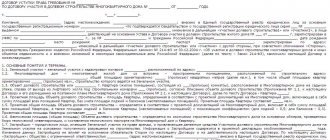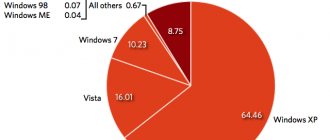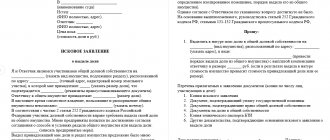When a person owns a share in an apartment, this does not mean that he owns a specific part of the living space. A share refers to an intangible object that can be turned into a real one by transferring it to a separate room.
Under what conditions and in what order this procedure is carried out will be described in detail in this article.
Is it possible to transfer a share to a room?
The legislation provides for the possibility of transferring shares into rooms, while the order of use of housing is determined, and a room is assigned to each owner.
This procedure may be required if:
- It is necessary to change the way housing is used.
- Intent to sell the share – the value of the allocated share increases significantly.
- The citizen intends to live in a separate room, and not own abstract meters.
Each co-owner has the right to demand a room that is proportional to his share in the common property (Article 247 of the Civil Code of the Russian Federation). When this option is not possible, compensation must be paid. In case of refusal, the citizen has the right to appeal to the judicial authorities.
It is also possible to allocate a share in kind (Article 252 of the Civil Code of the Russian Federation), but in reality this option is practically impossible, since it requires the ability to create a separate entrance, bathroom and other communications. Therefore, compensation is paid in return.
Judicial
If agreement is not reached, one of the co-owners may go to court. A prerequisite is the need to prove attempts at a peaceful settlement.
If the co-owners do not make contact, then it is enough to send them letters to continue to conclude an agreement. You must include in the envelope:
- option of a settlement agreement;
- letter requesting voluntary settlement;
- description of the attachment.
A sample letter and receipt receipt must be attached as evidence.
If the co-owners avoid receiving the document, then you must try to hand over the document in person. In case of refusal to receive, an act is drawn up in the presence of 2 witnesses.
Procedure
The issue is resolved through legal proceedings. The applicant sends documents to the court at the location of the property.
Part 1 art. 23 of the Code of Civil Procedure of the Russian Federation establishes the jurisdiction of cases on determining the procedure for using housing. The applicant must submit documents to the magistrate's court.
Algorithm of actions when going to court:
- Collection of documentation.
- Filing a claim.
- Going to court.
- Getting a solution.
Collection of documentation
Before going to court, it is necessary to prepare evidence of attempts at a peaceful settlement. Suitable for this purpose:
- notification of delivery of the letter and a copy of the request to enter into an agreement;
- a previously concluded voluntary agreement that needs to be challenged.
The following information must be attached to the claim:
- civil passport of the initiator of the process;
- extract from the house register;
- certificate of family composition;
- extract from the Unified State Register of Real Estate;
- title document;
- receipt of payment of the duty;
- technical plan of the apartment.
Documentation is prepared in an amount equal to the number of parties. For example, if there are 3 co-owners, then 4 packages of documents are needed (3 co-owners + court).
Filing a claim
The issue is resolved through legal proceedings. Therefore, you need to prepare a statement of claim.
It should contain the following data:
- name and address of the court site;
- data of the initiator of the process, including passport data and address;
- information about the defendant;
- third parties (if there are minors in the apartment, specialists from the district guardianship department may be invited to the process);
- name of the claim;
- information about all owners;
- reasons for the dispute;
- proposals for the use of housing;
- reference to the law (Article 247 of the Civil Code of the Russian Federation, Articles 30, 70 of the Housing Code of the Russian Federation);
- claim;
- list of attached documentation;
- signature and date.
Sample statement of claim for transfer of a share in an apartment to a room
Going to court
Documentation can be sent to the court as follows:
- Personally the initiator of the process. It is necessary to clarify the procedure for accepting applications. It can be found on the court's website. Documents are presented to the office. You must have your passport with you.
- Representative of the plaintiff. A prerequisite is the presence of a notarized power of attorney. When visiting, the representative must have the original power of attorney and civil passport. The authorized person is given the right to sign both the statement of claim and to certify copies of documents - annex to the claim.
- By post. When forming an envelope, special attention must be paid to the inventory of the contents. It is necessary to list all the documents that are attached to the claim and their number.
If there is a conflict between the parties to the process, it is advisable to involve a lawyer. The specialist will represent the applicant’s interests in court and help avoid mistakes in the preparation of documents.
Getting a solution
After making a decision you must:
- obtain a court decision;
- wait for it to be vested with legal force;
- mark the entry into force;
- fulfill it.
If the defendant wishes to challenge the decision, he can file an appeal.
If the parties do not want to comply with the court decision, then the issue must be resolved in another way. For example, by dividing an apartment or paying compensation.
Although the plaintiff can put a lock on the door of the room and, in fact, turn the apartment into a communal one.
Ways to transfer the share of an apartment to a room
There are 2 ways to turn a share into a room:
- Concluding an agreement on the procedure for using an apartment in shared ownership. Such a document is signed by all co-owners and certified by a notary office. Otherwise, it will not receive legal force. Owners have the opportunity to set the order of use at their own discretion.
- Appeal to judicial authorities. If it is impossible to reach a peaceful agreement, one of the owners sends an application to the court demanding the allocation of his share in the form of a room. If this is not possible, he is paid compensation and he loses ownership of part of the housing
Share in an apartment: how to turn a share in an apartment into your own separate room?
An apartment, like any property, can be owned by one person or several persons at the same time - in the latter case, the property is recognized as common.
The law provides for two types of common property – shared and joint. Joint property can only arise between strictly defined categories of subjects, primarily spouses.
In all other cases, when the law does not directly indicate that property is joint, it is considered shared.
The fundamental difference is that with shared ownership the shares of all co-owners are initially determined (they are indicated in the documents), but with joint ownership they are not.
Having a share in common property (no matter whether it is joint or shared), you should understand that this is not a specific part of the property. If your ownership documents indicate, for example, “1/3 of the ownership of an apartment,” then you do not automatically become the owner of one of the three rooms in this apartment
If your ownership documents indicate, for example, “1/3 of the ownership of an apartment,” then you do not automatically become the owner of one of the three rooms in this apartment.
Therefore, owning a share in an apartment brings a lot of inconvenience:
- the co-owner is not assigned a certain part of the property, which he can designate as his own,
— it is impossible to allocate a personal account for separate payment of utilities,
- you cannot freely dispose of your share: any action must be agreed upon with all other co-owners (from registration in the apartment to the sale of the share).
Therefore, it is better to allocate your share in the apartment into a separate room. How can I do that?
The law allows two options:
- divide shared ownership by agreement of all co-owners
- allocate your share from the common property: either in kind (in the form of a separate, isolated part of the property), or by buying out the share by the remaining co-owners.
The agreement is subject to mandatory certification by a notary; it is necessary to submit documents confirming ownership of the property.
The shares are distributed as agreed by the co-owners (the area of the room is compared with the share - the deficiency or excess is compensated for by money).
Based on the agreement, Rosreestr issues new certificates of ownership of the corresponding room in the apartment to each co-owner. Their right to shared ownership is terminated.
Agreement
The document is provided in written form. It is compiled according to the following algorithm:
- Discussion of conditions.
- Finding out whether it is possible to allocate a separate room to each co-owner who wants to allocate a share.
- Establishing the amount of compensation payment.
- Drawing up a draft agreement.
- Contacting a notary office;
- Contact Rosreestr to register changes.
- Receiving modified documentation.
- Separation of personal accounts and determination of the procedure for payment for housing and communal services.
Then the data is entered into the Rosreestr database and the owners are issued new title documentation in the form of extracts from the Unified State Register in paper or electronic form. From this moment on, residents can use the apartment in the prescribed manner.
Voluntary
Voluntary procedure means the conclusion of an agreement. For this purpose, the parties may not involve third parties.
Expert opinion
Sokolov Alexander Konstantinovich
Legal practitioner with 8 years of experience. Specializes in criminal law. Extensive experience in document examination.
It is enough to formalize the agreements reached in writing. Notarization is not required. However, the parties can contact a notary office. Although notarization significantly increases the cost of the document.
But the law makes the agreement valid regardless of certification by a notary. Therefore, if the parties violate the agreements reached, each party has the right to go to court.
In practice, written agreements on living in an apartment are extremely rare between co-owners. In most cases, the issue is raised at the stage of an established conflict. Therefore, the parties immediately go to court.
However, even for a trial, evidence of attempts at a peaceful settlement is required. Therefore, the possibility of self-settlement cannot be ignored.
Basic rules of voluntary settlement:
- The allotment must not violate the rights of other co-owners. The size of the room should be based on the citizen’s share of the living space.
- Access to common areas must be maintained. In addition, the creation of potentially dangerous situations is prohibited. For example, a ban on leaving a living space.
- Allocation is possible only in relation to a living room. It is prohibited to exercise the right to a share at the expense of the kitchen or pantry.
Sample agreement
The agreement must contain the following information:
- document's name;
- date and place of registration;
- information about the owners;
- information about the property (indicating the postal address and area);
- description of shares in the apartment of each owner;
- order of division;
- procedure for using public facilities;
- rights and obligations of the parties;
- liability of the parties;
- signatures.
Sample agreement on transferring a share in an apartment to a room
Judicial order
If the owners do not reach an amicable agreement, an appeal to the judicial authorities will be required. The application is submitted by the owner of the share who wants to turn it into a room. The remaining owners or those objecting to the allotment act as defendants.
The application is sent to the magistrate court precinct at the location of the apartment.
The consideration of the case takes place in several stages:
- Sending the application along with accompanying documentation to the court office.
- Appointment of the meeting and notification of participants.
- Conducting a court hearing and adopting a judicial act.
- Obtaining executive documentation.
- Transfer of papers to Rosreestr for making changes.
Required documents
The following documents will be required to be submitted to the court:
- Applicant's passports.
- Copies of the statement of claim.
- Evidence of attempts at a peaceful settlement (notifications, letters, draft agreement).
- Receipts for payment of state duty (200 rubles).
- Extracts from the house register.
- Document of title to the share.
- Extract from the Unified State Register of Real Estate.
- Housing registration certificates.
- Other documentation.
Copies of the papers are sent to the court, the originals are presented at the hearing for review. It is necessary to send copies of documents to all participants in the process.
How to allocate a share in an apartment in kind through the court: step-by-step instructions 2021
So, we found out that the share in kind is allocated based on two factors: the area of the apartment in m² and the number of applicants. By acting through the court, and not by agreement of the parties, co-owners can count on equal “cuts”. However, this does not exclude other options.
Procedure, algorithm
The first question of people who cannot agree is where to start? The interested party files a claim against the remaining applicants for the shares. The dispute that arises is resolved in court on the basis of the information and arguments provided.
Step-by-step instructions (current in 2021):
- Decide on the option for allocating the share: in kind or in monetary terms.
- Try to come to an agreement with all owners on a peaceful resolution of the issue.
- Request an expert assessment of the property.
Expert opinion Dmitry Nosikov Lawyer. Specialization: family and housing law.
The expert's report includes the following information:
- the technical side of the question - is it possible to divide the apartment in kind;
- available options for allocating shares;
- what is the number of shares and how do they relate to the total area of the apartment (% and m²);
- deterioration of the living space (room);
- market price of the property;
- the final amount of delimitation of the share in kind.
- Draw up a statement of claim for allotment in kind, prepare a package with documents, pay the state fee for filing a claim.
- Send the package of documents to the court.
- Attend court hearings, receive the final court decision and/or appeal the decision.
The final step will be state registration of changes in the MFC “My Documents”. What does this mean? Documents are submitted not only by the “singled out” owner, but also by his co-owners.
Statement of claim (sample)
The consideration of claims for the allocation of shares in kind is carried out not by magistrates, but by district or city courts (Article 30 of the Code of Civil Procedure of the Russian Federation). Which court to choose? The address of the site must match the location of the disputed property.
The contents of the statement of claim include:
- information about the participants and the court - name of the court, full name, address, contact details of the parties, and in the case of involving witnesses - information about third parties;
- information about the property - address, floor, number of rooms, total area m², number of shares, participants;
- information about documents and type of right - common shared or joint ownership, what documents confirm this;
- information about pre-trial attempts to resolve the dispute;
- information about the characteristics of the apartment and expert assessment on the allocation of a share in kind;
- calculation of the amount of compensation - if allocating a share in kind is impossible;
- list of documents and personal signature of the plaintiff.
claim for allocation of a share in kind in an apartment
Required documents
The current practice obliges plaintiffs to prepare several packages of documents at once, depending on the number of participants in the process.
List of documents:
- personal – adult passports, children’s birth certificates;
- technical – registration certificate for the apartment, extract from the Unified State Register with cadastral data;
- expert - assessment of residential premises in the BTI, act of the planned allocation of shares in kind (if possible);
- financial - receipt of payment of state duty, calculation of compensation for allocating a part of the apartment (room);
- establishing and approving the right - a purchase and sale agreement, a certificate of inheritance, an agreement of donation, exchange of housing, a privatization agreement + an extract from the Unified State Register or a colored certificate of ownership of residential premises.
A specialist from the MFC or Rosreestr will require participants to provide shares of the Russian Federation passport, a copy of the court’s writ of execution and a receipt for payment of the state duty. Now you don’t have to submit a receipt - the employees themselves will check the fact of payment using the electronic database.
Deadlines
Consideration of the case on its merits takes from 2 months to six months (in some cases longer).
Calculation of timing for allocating shares in kind:
- examination of companies with access to SRO – up to 30 working days;
- preparation of documents + request for certificates – up to 14 days;
- examination of the claim by the court – 5 working days;
- preliminary hearings – 30 days after filing the claim;
- the total time for judicial review is from 2 to 6 months;
- The period for appeal is one month.
Total: allocating a share in an apartment in kind takes from 3 to 7 months, without taking into account unforeseen situations in the form of delays in litigation by the defendant.
Deadlines
Justices of the peace consider cases within a month from the date of receipt of documents. However, in practice, the procedure may take longer due to the absence of parties, illness of participants, postponement of meetings, the need for additional examinations, sending requests, etc.
After the adoption of a judicial act, any participant can send a complaint to a higher authority within a month. Only after 30 days have expired does the decision become legally binding and can be implemented.
Nuances
Owners who decide to convert their shares into separate rooms should take into account the following factors:
- Given the current procedure for using housing, which has been used for 10-15 years, it will not be easy to change it.
- The size of the part belonging to him - if it is small (less than 10 m2), allocating a separate room will be impossible, and the judge will decide on payment of compensation.
- A person with a child, family members with disabilities, etc. can allocate a room whose size exceeds the share.










